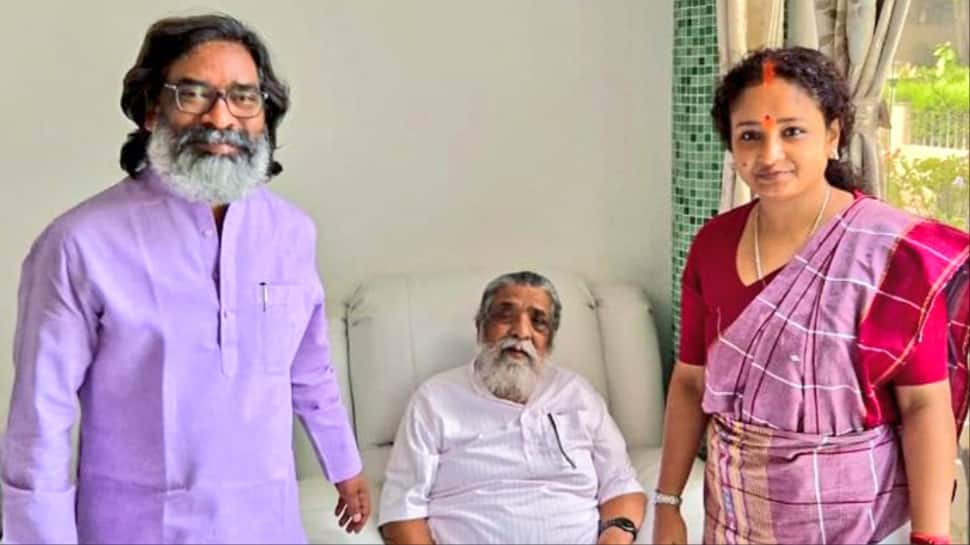 |
|
The Jharkhand Assembly elections concluded with a surprising and resounding victory for Hemant Soren and his JMM-led Mahagathbandhan alliance. Despite facing arrest by the Enforcement Directorate (ED) on money laundering charges just weeks prior, Soren not only retained his position as Chief Minister but secured a landslide victory, winning over 56 seats. This remarkable comeback can be attributed to several key factors, highlighting the complex dynamics of Indian state-level politics and the limitations of some of the BJP's strategies.
One of the most significant factors contributing to Soren's success was the surge of public sympathy generated by his arrest. While the BJP attempted to portray Soren as corrupt and exploit anti-incumbency sentiment, the arrest instead galvanized support for him. His wife, Kalpana Soren, effectively capitalized on this sentiment, presenting her husband as a victim of politically motivated persecution. This narrative resonated with voters, transforming a potential liability into a powerful political asset. The BJP's attempts to highlight alleged corruption charges were overshadowed by the perception of an unfair targeting of a sitting Chief Minister, allowing Soren to successfully frame the election as a battle against the BJP's alleged misuse of investigative agencies.
The BJP's strategy of focusing on the issue of Bangladeshi infiltration also proved counterproductive. While the party, including prominent figures like Prime Minister Narendra Modi and Himanta Biswa Sarma, heavily emphasized this issue, portraying certain regions as becoming 'mini-Bangladeshes', it ultimately backfired. The ruling coalition successfully countered this narrative by portraying the BJP's stance as divisive and communal, exploiting the prevailing sentiment against religious polarization. This successfully shifted the focus from the BJP's core message, allowing Soren's campaign to effectively paint the BJP as employing divisive tactics rather than addressing real governance concerns.
Furthermore, the BJP's lack of a clear Chief Ministerial candidate proved to be a significant disadvantage. The absence of a prominent, relatable figure to contrast with Soren hampered their campaign. While the BJP deployed significant resources and high-profile leaders like Himanta Biswa Sarma and Shivraj Singh Chouhan, the lack of a local face to represent the party's aspirations for the state's leadership arguably weakened their message and appeal. This stands in stark contrast to Soren's ability to present himself as a familiar, if controversial, figure already intimately connected to the people of Jharkhand.
The actions of the ED and CBI, while intended to weaken Soren's position, inadvertently bolstered the Mahagathbandhan's narrative of political persecution. These agencies' raids and arrests of ruling party figures, while potentially uncovering legitimate issues, were framed by the opposition as politically motivated attacks designed to undermine a democratically elected government. This allowed the INDIA bloc to rally support by portraying the actions of the investigative agencies as tools of political oppression rather than impartial instruments of justice. This perception ultimately allowed Soren to consolidate support amongst voters who viewed the BJP's actions as an overreach.
Finally, the BJP's attempt to attract support through defections from Soren's coalition, notably his sister-in-law Sita Soren and close aide Champai Soren, failed to produce significant electoral gains. While such defections are common in Indian politics and can often impact electoral outcomes, they did not yield the anticipated results for the BJP in this instance. This suggests that despite attempts to undermine Soren's position by fracturing his support base, the BJP ultimately failed to effectively translate these defections into a significant electoral advantage.
In conclusion, the Jharkhand Assembly election results demonstrate that political strategy, even in the face of seemingly insurmountable odds such as an arrest on corruption charges, can be turned into a winning formula through adept messaging and exploitation of the political climate. Soren's victory showcases the importance of public sentiment, effective counter-narratives, and the potential pitfalls of highly divisive tactics and the lack of a strong CM candidate for the opposition. The outcome underscores the complexities of Indian politics and the limits of utilizing investigative agencies for overtly political purposes.
Source: Jharkhand Assembly Polls: 5 Factors That Helped Hemant Soren Script Historic Comeback
